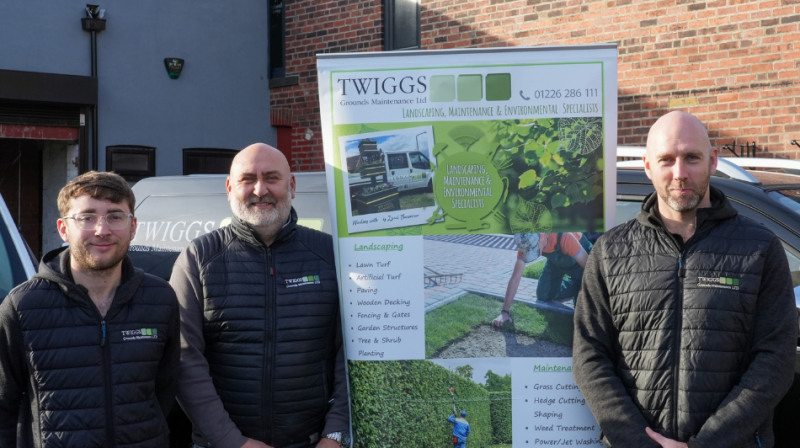A BARNSLEY business is investing in solar panels and battery-powered tools to slash energy bills and cut back undergrowth.
Ground maintenance firm Twiggs has gained grant funding to invest in 29 solar panels for the roof of their 6,916 sq ft business base at Rockingham Works in Barnsley.
It’s estimated that this large new photo-voltaic system will generate all the energy the business needs to run its office, plus more on top to charge the power tools it carries to jobs across the borough.
Twiggs works with public and private sector clients on outdoor maintenance and landscaping work, as well as with Barnsley Council, on contracts to help volunteers keep their local community environments clean and accessible.
The company gained a grant to back its £19,000 investment in renewable energy at work after taking part in the Net Zero Barnsley programme delivered by The Business Village in partnership with Barnsley Council.
Twiggs office manager Jordan Gregory worked with specialist Net Zero Barnsley consultants to calculate the company’s carbon footprint and draw up a decarbonisation plan, identifying practical measures to reduce it.
Jordan said: “Attending the Net Zero Barnsley workshops was a really positive experience, and we learned a lot from the course leaders and other businesses.
“As well as deciding to invest in solar panels and switch to battery powered tools, it has prompted us to put new systems in place to work smarter and reduce, reuse and recycle right across the business.
“All this is saving us money and time as well as cutting our carbon emissions.”
It’s estimated that Twiggs solar panels should save the business over £2,500 a year on energy bills and reduce their annual CO2 carbon emissions by 1580kg.
Twiggs is replacing its petrol-fuelled tools with high-quality battery-powered cordless alternatives as they come to the end of their lives.
Jordan, who joined the business as an apprentice in 2017, said: “Our new battery-powered strimmers can be charged securely here at base using our solar power and we can charge up replacement batteries to be carried to jobs too if required.”
Battery-powered tools have become more widely used across the industry in recent years as they are not only greener than traditional petrol-fuelled tools, but, for the users, they’re also lighter, quieter and cause much less vibration and no toxic fumes.
Twiggs has also stepped up its recycling regime and reviewed its management of vehicle routing so that it co-ordinates jobs, quote visits and collections better to reduce mileage and ensure every work journey is as productive as possible.
A new recycling initiative has involved donating its shredded paper waste to the Helpful Heathens allotment at Stairfoot to make bedding for chickens. The soiled shreds can then be composted for the vegetables.
Net Zero Barnsley business development manager Kevin Steel said: “Jordan is leading the charge at Twiggs and working towards net zero carbon emissions all businesses have to achieve. It’s great to see such a well-known Barnsley company which works at the heart of so many of our communities championing sustainability.
“As always, it’s not just about investment in renewables but about making small changes to the way we work to make green thinking part of the day job.”
Twiggs was established by John Twigg in 2007 and quickly grew from ‘a man with a van’ business to a team of 12 including his wife, Wendy. Working with private and public sector clients, members of the Twiggs team often go into local schools to talk to kids about how important it is to look after their local environment.
All UK businesses must reduce carbon emissions to net zero by 2050, and Barnsley Council has set an earlier target of 2045. Net Zero Barnsley is supporting dozens of Barnsley businesses to work towards this goal.
The Business Village is delivering the Net Zero Barnsley programme, in partnership with Barnsley Council, as part of the Low Carbon Project, part-funded by the UK Government through the UK Shared Prosperity Fund. Sheffield City Council is the accountable body for the South Yorkshire region. The Low Carbon project has received £3,445,606 from the UK Government through the UK Shared Prosperity Fund.
 Christmas
Christmas


















